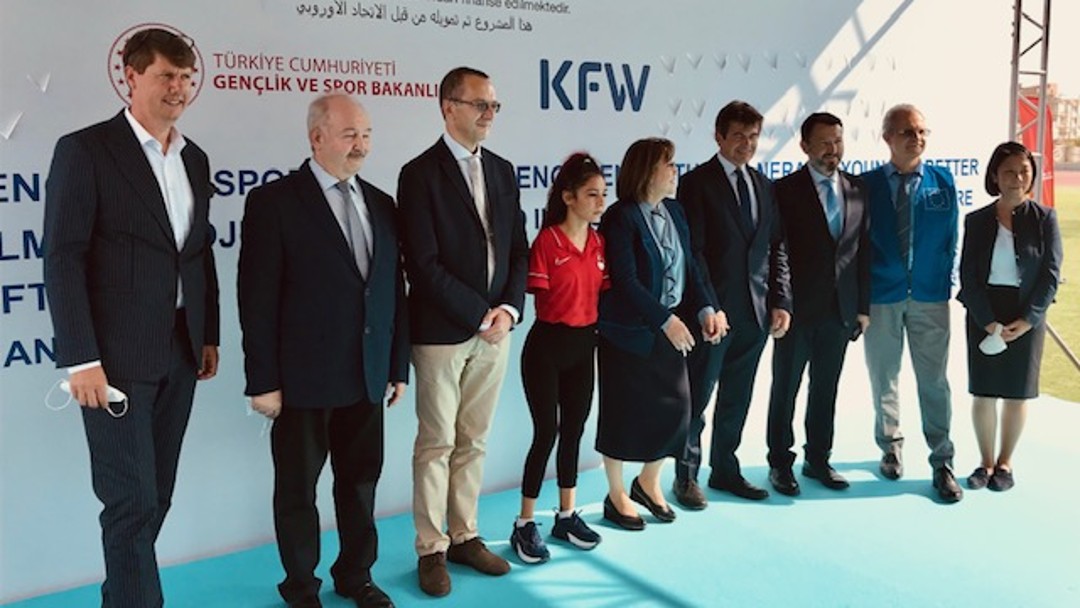News from 2021-10-19 / KfW Development Bank
FRiT programme promotes the integration of young refugees in Turkey
KfW and the EU support schools and labour market opportunities

Since 2016, the EU has been supporting the integration of Syrian refugees in Turkey with six billion euros under FRiT ("Facility for Refugees in Turkey"). KfW was selected as a key financier under this facility and provides funding primarily for school buildings, vocational training and youth facilities under this programme. This partnership is now bearing concrete fruit.
Sevilay Öztürk encouraged the Syrian children in the Turkish city of Gaziantep. "Never give up," the 17-year-old Turkish woman called out to them during the opening of a sports festival for the integration of young refugees. Öztürk herself is an example of what willpower can make possible. Severely disabled from birth - she was born without arms - she has gained recognition through sport. She has already participated twice in the Paralympics, in Rio de Janeiro and Tokyo, where she won a bronze medal in backstroke this year.
KfW is financing the construction of 28 sports and youth centres in Eastern Anatolia on behalf of the European Union. "Joint recreational activities are important for the cohesion of Syrian refugees and Turkish hosts," said Klaus Müller, KfW Head of Department Southeast Europe and Turkey, at the opening of the sports centre, which includes football pitches and an athletics facility with running track.
The project is part of the agreement between the EU and Turkey called FRiT. It began in 2016 and runs until 2025 for the time being. The financial commitments amount to EUR six billion, half of which comes from the EU and half from the EU member states. The EU expects its cooperation partners to implement the projects quickly, effectively and efficiently. KfW's contribution amounts to EUR 690 million, which Nikolaus Meyer-Landrut, EU Ambassador to Turkey, describes as a "reliable partner of the EU". KfW is one of the largest financiers of the EU programme, in which the World Bank and the European Investment Bank, among others, also participate alongside humanitarian organisations.
Four million refugees live in Turkey, no country in the world hosts more. 90 % of them come from neighbouring Syria, the others from Afghanistan, Iraq, Iran and Somalia. The bitterly fought civil war in Syria has been going on since 2011. During that time around ten million Syrians have left their country because of the life-threatening conflicts.
Integration begins in schools and sports
The FRiT programme, which has so far been divided into two tranches, is paying special attention to the 1.2 million Syrian children and young people of school age. The funds for young migrants in particular serve to integrate the Syrian community into Turkish society.
All projects that KfW promotes within the framework of FRiT and in consultation with the relevant ministries of the Turkish government are geared towards this goal. At EUR 425 million, the bulk of KfW's contribution is going towards the construction and equipping of 344 schools. They are mainly being built in Turkish municipalities, as less than ten percent of the people who have fled Syria live in refugee camps. 74 schools have already been completed and opened their doors for classes. Syrian and Turkish children attend the schools together, which strengthens integration.
Classes already began in 2018 in the first KfW-financed school in Gaziantep. The eastern Anatolian city, Turkey's seventh largest municipality with 2.1 million inhabitants, is located near the border with Syria. Half a million Syrian refugees live here alone, barely two hours by car from the Syrian city of Aleppo with its millions of inhabitants. By way of comparison, Hamburg, barely smaller than Gaziantep, is home to almost 50,000 refugees.
Gaziantep's mayor Fatma Sahin cares intensively for the displaced people from the neighbouring country, which earned her the Italian Minerva Award for Special Services by Women in the World a year ago. "I hope that we can be role models with what we are doing in Gaziantep," said Sahin, who came to the inauguration of the sports centre together with Paralympics athlete Öztürk.
KfW is providing a total of EUR 25 million on behalf of the EU for the construction of 25 sports halls, outdoor sports facilities and youth centres. The main idea is that young people from both countries will get along better if they can spend their free time together. It is estimated that about 120,000 young people can be reached with these services.
Increasing opportunities on the training and labour market
KfW also provides vocational training for young refugees and Turkish adolescents under the FRiT programme, so that they have better opportunities on the labour market. EUR 125 million are being spent on this project; among other things, 1,200 learning workshops have been equipped in 55 schools and are enriching the teaching. Scholarships are also paid for to enable pupils to receive vocational training in the first place and to make it easier for them to enter the labour market later on.
And finally, EUR 75 million of KfW's portfolio will flow to Syrian and Turkish MSMEs (micro, small and medium-sized enterprises). The financial assistance is intended to support the companies in hiring unemployed or informally employed people on a regular basis.
Improving job opportunities for refugees will remain a focus of the cooperation between the EU and Turkey in the "Facility for Refugees in Turkey" and thus also of KfW's involvement in the programme. This is because the longer Syrian refugees live in Turkish communities because a return home is out of the question, and the better they are integrated, the more likely it is that they will see a permanent future on Turkish soil.

Share page
To share the content of this page with your network, click on one of the icons below.
Note on data protection: When you share content, your personal data is transferred to the selected network.
Data protection
Alternatively, you can also copy the short link: https://www.kfw-entwicklungsbank.de/s/enzBWrMC.Ck_A
Copy link Link copied